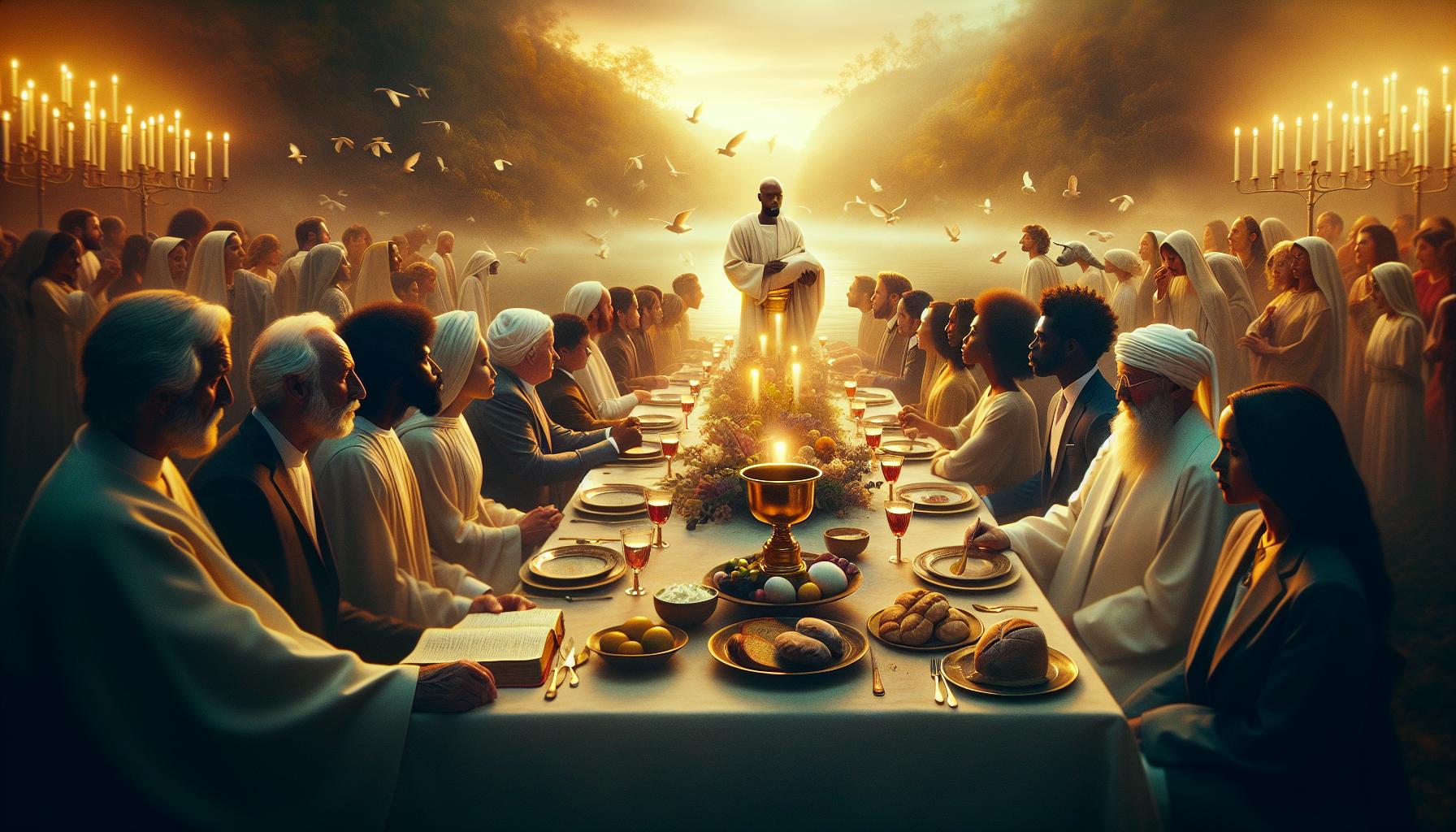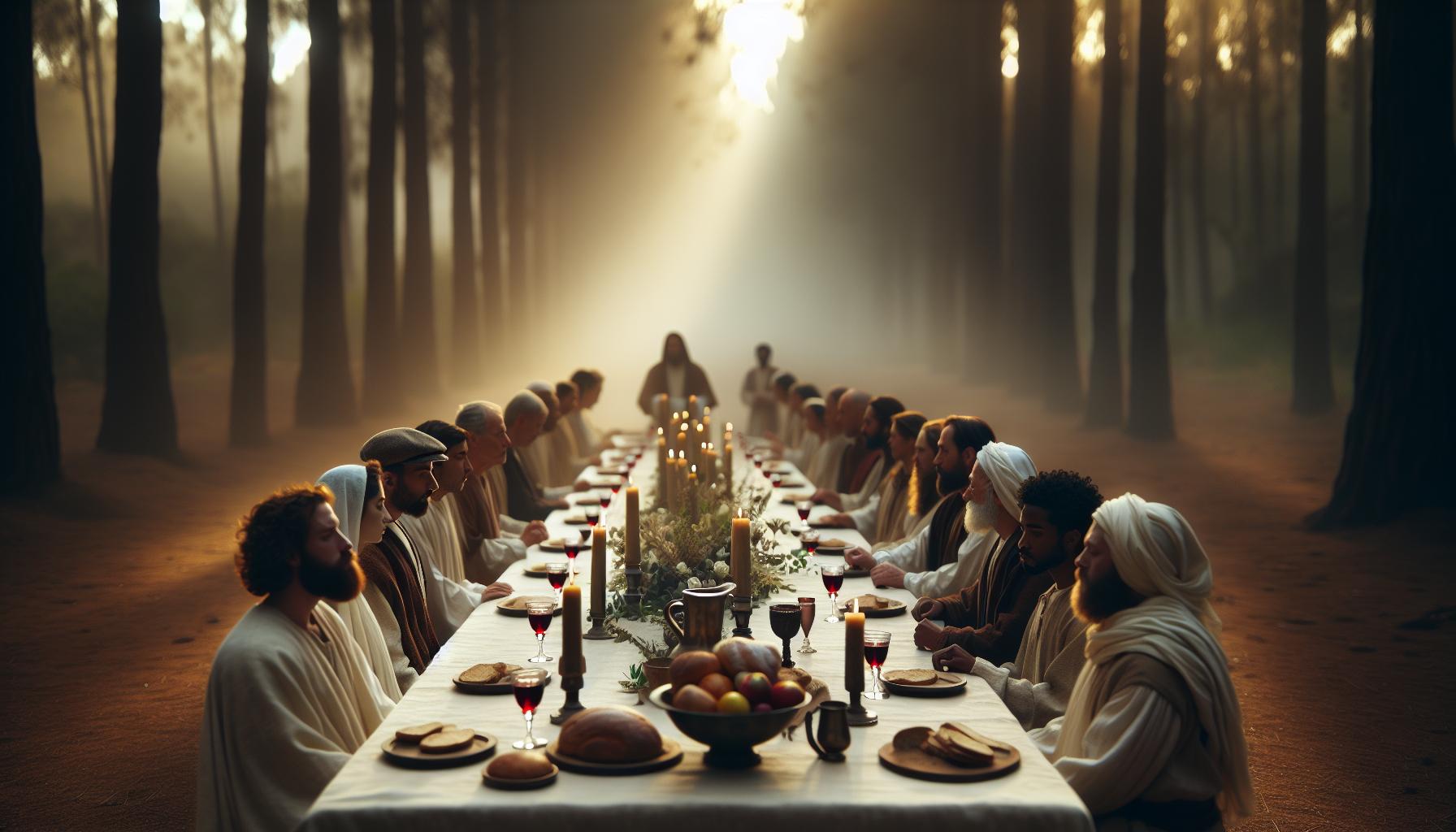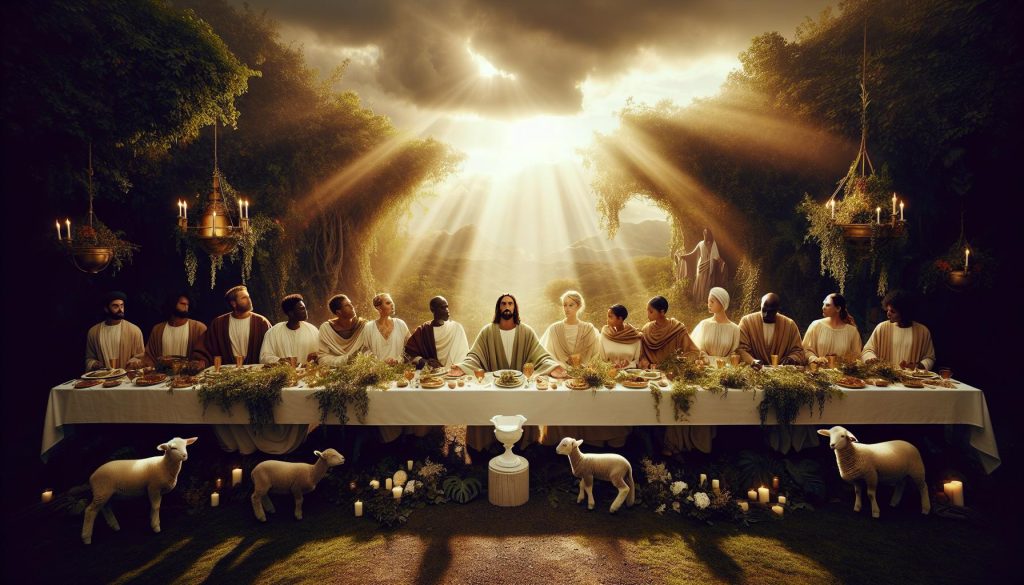The Wedding Supper of the Lamb is a captivating symbol found in Christian eschatology, representing the ultimate union between Christ and His followers. This event embodies themes of love, unity, and celebration, paralleling the joyous gatherings of wedding celebrations that many couples cherish today. Understanding its significance can deepen your appreciation for both religious and secular marriage ceremonies, making it a relevant exploration for any wedding journey. As couples plan their special days filled with hope and commitment, learning about this profound representation might inspire a greater connection to their own vows. Join us as we dive into the essence of the Wedding Supper of the Lamb, unraveling its meaning and its relevance to today’s wedding traditions. This journey not only honors a rich tapestry of beliefs but also resonates with the universal desire for love and companionship that transcends time and culture.
Understanding the Wedding Supper of the Lamb’s Significance
The Wedding Supper of the Lamb is a powerful imagery found within the Christian tradition, symbolizing the ultimate celebration of unity with Christ at the end of time. This banquet is not just a feast; it represents the fulfillment of God’s promises, a time of joy, and the culmination of the spiritual journey for believers. Much like a wedding reception, where love is celebrated, the Wedding Supper signifies the joyous occasion of the divine union between Christ (the Bridegroom) and the Church (His Bride). This imagery resonates deeply within the hearts of Christians, who perceive it as the shared hope of eternal communion with their Savior.
In the Gospel of Luke, Jesus frequently uses the metaphor of a banquet to illustrate the Kingdom of God, inviting all to partake in His love and grace. This banquet is not reserved for the elite; rather, it opens its doors wide to the marginalized and weary. Each invitee represents an aspect of the Church, emphasizing inclusivity and unity among believers. The act of gathering around a table also reflects the richness of fellowship, where stories are shared, and relationships are strengthened, embodying the communal essence of faith in action.
Moreover, the significance of the Wedding Supper encapsulates theological themes of redemption and celebration. Just as couples prepare for a wedding day filled with anticipation and significance, Christians prepare for the ultimate celebration-one where pain, suffering, and sin are eradicated. This banquet serves as a future promise of hope, reminding believers to live in the light of that hope today, cultivating a spirit of love and community in their everyday lives.
Ultimately, understanding the Wedding Supper of the Lamb shifts the perspective of individuals from mere spectators to active participants in a divine narrative. By embracing this vision, believers are encouraged to reflect Christ’s love in their relationships and foster bonds that mirror the unity celebrated in the heavenly banquet. This call to love and serve one another resonates deeply, fostering an environment where the principles of generosity, hospitality, and joy reflect the heart of what the Wedding Supper stands for-an invitation to experience the depths of divine love.
Biblical Context: The Wedding Supper Explained
The imagery of a grand banquet serves as the backdrop for one of the most profound expressions of joy and unity found in scripture-the Wedding Supper of the Lamb. This feast, described in the Book of Revelation (19:6-9), stands as a culmination of God’s redemptive plan for humanity. Believers are invited to partake in this heavenly celebration, a metaphorical gathering that signifies the ultimate union between Christ and His Church, often symbolized as a wedding between a bride and groom. This beautiful imagery resonates deeply, illustrating not only the love and commitment of Christ but also the joyful anticipation of believers uniting with their Savior in eternal fellowship.
Understanding this banquet’s biblical context requires delving into the significance of weddings in ancient cultures, where marriage was viewed as more than just a legal contract; it was a sacred covenant filled with deep communal and spiritual meaning. Weddings were celebrated with joyous feasting, emphasizing the importance of community and family coming together in celebration. Just as earthly weddings mark the beginning of a new life shared together, the Wedding Supper represents the dawning of a new era in God’s kingdom, where pain, sorrow, and sin disappear, leaving only joy and communion in His presence.
Throughout the New Testament, Jesus uses the analogy of banquets frequently, inviting the marginalized, the lost, and the weary to partake in His grace. This openness reflects the character of God, who desires all people to become part of His family. The Wedding Supper is thus not exclusive; it is a call to all to join in the divine celebration. The act of gathering together around a table serves as an essential reminder of the community created by shared faith, where stories are shared, hearts are united, and believers grow together in their journey toward unity in Christ.
In preparing for this future event, Christians are encouraged to embody the qualities celebrated at the Wedding Supper-love, hospitality, and joy. Each act of kindness and generosity in daily life reflects the heart of this divine gathering, promoting an atmosphere of fellowship that mirrors the heavenly banquet. Therefore, understanding the Wedding Supper of the Lamb not only enriches one’s grasp of biblical teachings but also inspires practical living that aligns with Christ’s love, ultimately guiding believers toward a faithful and hopeful existence as they await the fulfillment of God’s promises.
Symbolism of the Wedding Feast in Christianity
The wedding feast serves as a rich tapestry woven with layers of meaning in Christianity, encapsulating love, joy, and divine communion. The imagery of a grand banquet invites believers to envision a celebration that transcends earthly limitations, offering a glimpse into the heavenly realm where the faithful are united with Christ. This symbolism is profoundly anchored in scriptural references, particularly in the Book of Revelation, where the Wedding Supper of the Lamb signifies the ultimate culmination of God’s promise and a grand, sacred reunion.
At the heart of the Wedding Supper’s symbolism is the concept of the Church as the Bride of Christ, emphasizing intimacy and commitment. This reflects the sacred covenant established in marriage, where two become one. Just as a bride and groom eagerly anticipate their union, there is an equivalent joy and anticipation for believers who await their reunion with Christ. This correlation illustrates the profound love God has for humanity, inviting them into an unending relationship filled with grace and joy.
Furthermore, the feast embodies the principles of abundance and inclusion. In ancient cultures, a wedding feast was not merely a meal; it represented community, generosity, and hospitality. Everyone is invited to partake in this celebration, much like the open invitation Jesus extended during His earthly ministry. The notion that all are welcome serves as a powerful reminder that God’s love knows no bounds and extends to all, regardless of background or past. This is echoed in the parable of the Great Banquet, where the host invites the poor and marginalized, symbolizing God’s heart for the outcasts.
Additionally, the Wedding Supper is a foreshadowing of the eternal joy believers will experience in communion with God. It invites reflection on personal faith journeys, encouraging believers to cultivate relationships based on love, forgiveness, and community. As the Wedding Supper invites everyone to join in feasting, it challenges individuals to reflect this generosity in their lives, extending the love of Christ through acts of kindness and compassion. The joyful anticipation of this heavenly banquet inspires hope, urging believers to live out their faith in powerful and transformative ways.
The Role of the Bride and Groom in the Celebration
At the heart of the Wedding Supper of the Lamb lies the profound relationship between the bride and groom, a thematic centrality that encapsulates unity, love, and divine purpose. In Christian theology, the bride symbolizes the Church, while the groom represents Christ, each playing a unique role in this celestial celebration. This imagery weaves together the anticipation of a heavenly reunion with the core values of commitment and fidelity that are celebrated in earthly marriages. Understanding these roles not only enhances our appreciation of the Wedding Supper but also inspires couples celebrating their unions.
The role of the bride transcends mere ceremonial duties; she embodies the collective faith and devotion of the Church. Her preparation signifies a readiness for intimacy, requiring spiritual awakening and purity, akin to a bride preparing for her earthly wedding. This preparation includes cultivating a heart of service, embodying grace, and fostering community among believers. As the wedding day approaches, the bride’s excitement reflects the love and anticipation that believers feel as they await their union with Christ. The groom, on the other hand, symbolizes Christ’s sacrificial love and leadership. His role in the celebration is one of protector and provider, mirroring the qualities men are encouraged to embody in their earthly relationships. His commitment to love the bride unconditionally illustrates the dedication Christ shows to His followers, inviting them into a relationship based on mutual respect and eternal devotion.
In practical terms, couples preparing for their wedding-a reflection of the ultimate Wedding Supper-can draw inspiration from these biblical roles. As they plan their ceremony, they might consider how their actions represent their commitment, not just to each other, but also to their community and faith. Elements such as shared vows, symbolic gestures, and acts of service during the wedding can mirror the divine relationship celebrated in the Wedding Supper.
Moreover, the authentic celebration of love during weddings provides a glimpse of the joy and fellowship associated with the Wedding Supper of the Lamb. Couples can weave this celebration into their lives, reminding themselves that their union is a testament to God’s love and that their marriage vows reflect a divine covenant. Through their love, they participate in this larger narrative, fostering a sense of community and joy similar to that which the Wedding Supper promises. Thus, the roles of the bride and groom not only celebrate their commitment but also exemplify a reach towards something significantly larger, echoing the joyous and inclusive nature of God’s eternal banquet.
Comparing the Wedding Supper to Other Biblical Banquets
The Wedding Supper of the Lamb is a remarkable culmination of biblical feasts, rich with symbolism and significance. When we delve into its connections with other biblical banquets, it becomes clear that this ultimate celebration reflects a divine narrative that resonates throughout Scripture. Each banquet serves a unique purpose, conveying messages of redemption, community, and divine promise. For couples preparing for their own weddings, understanding these themes can enrich their celebrations, allowing them to consciously weave elements from these biblical feasts into their own festivities.
One of the most notable comparisons is with the Passover Feast, which commemorates Israel’s deliverance from slavery in Egypt. Just as the Passover meal is a solemn reminder of God’s faithfulness and the call for purity, the Wedding Supper invites believers to celebrate the Ultimate Deliverance through Christ. This connection underscores the sentiment of spiritual freedom that couples can embrace as they prepare to unite in marriage. Incorporating elements of renewal, such as asking guests to reflect on their spiritual journeys during the wedding, can create a poignant atmosphere reminiscent of the Passover’s significance.
The Last Supper also provides profound insight into the Wedding Supper’s meaning. During this final meal with His disciples, Jesus instituted the Eucharist, establishing a new covenant through His sacrificial love. This sacred gathering reflects intimacy, commitment, and the importance of community-elements that are essential in both a wedding and the Wedding Supper. Couples might consider sharing a communion-like moment in their ceremonies, reinforcing the bond of not only their marriage but also their connection to the faith community that surrounds them.
In addition to these feasts, the imagery of the Great Banquet parables told by Jesus reveals an open invitation to all, emphasizing inclusivity and celebration. This serves as an encouraging reminder for couples to foster an environment of love and acceptance, welcoming family and friends from varied backgrounds to engage in their festive union. By embracing this spirit of inclusion, they mirror the joyous nature of the Wedding Supper of the Lamb, where everyone becomes part of the divine celebration.
Ultimately, understanding these connections allows couples to enrich their wedding planning and ceremonies, aligning their joyous day with the profound theological meanings behind biblical feasts. By weaving in elements from these sacred meals, couples celebrate not only their union but also the larger story of faith, community, and hope that God is weaving into each of their lives.
Theological Perspectives on the Wedding Supper
The Wedding Supper of the Lamb serves as a profound theological symbol of culmination and communion within Christian doctrine. This ultimate feast highlights the joyous union between Christ and His Church, reflecting themes of love, redemption, and hope that resonate deeply within wedding celebrations. As couples embark on their journey toward marriage, they can draw inspiration from the theological significance of this heavenly banquet, understanding it not only as a future event but also as a present reality that infuses their commitment with spiritual meaning.
One pivotal perspective on the Wedding Supper is its representation of God’s ultimate promise to His people. In Revelation 19:7-9, the invitation to the wedding feast represents a fulfillment of God’s covenant and assurance of eternal life. Each couple preparing for their wedding can reflect on this divine relationship, recognizing that their love mirrors Christ’s unconditional acceptance and commitment. Incorporating spiritual elements into the ceremony, such as readings from Scripture that celebrate the themes of love and promise, can create a sacred atmosphere that not only honors their union but also God’s faithfulness.
Moreover, the wedding feast symbolizes the gathering of the faithful, emphasizing community and the joy of togetherness. Just as the Wedding Supper includes all who have accepted Christ, couples can cultivate an environment of love and inclusivity at their own weddings. Inviting family and friends from diverse backgrounds creates a rich tapestry of relationships, reminding everyone present that love transcends boundaries. Including traditions from various cultures or shared experiences within the community during the celebration can strengthen connections among guests and reinforce the idea that marriage is not only a union of two individuals but also a celebration of community.
In practical terms, couples can personalize their ceremonies by incorporating elements that reflect their understanding of the Wedding Supper’s significance. This might include a meaningful communion moment, allowing guests to participate in a shared act of remembrance and commitment, echoing the intimacy of Jesus’ Last Supper with His disciples. Such gestures transcend mere ritual; they invite participants into a deeper experience of love, faith, and connection, echoing the eternal banquet where all are welcome. By embracing this profound symbolism and applying it to their wedding planning, couples can create a celebration that echoes the heavenly promise of unity, love, and divine purpose that lies at the heart of the Wedding Supper of the Lamb.
Cultural Interpretations of the Wedding Feast
The Wedding Supper of the Lamb is a concept rich with cultural significance that transcends borders and traditions, drawing on the universal themes of love, celebration, and community. In many cultures, weddings are not just personal milestones but communal events that symbolize the joining of families and the forging of new relationships. This echoes the divine banquet imagery, where the supper serves as a metaphor for unity among believers and a promise of joy that extends well beyond the ceremony itself.
In various cultures, the ideals surrounding the wedding feast can be observed through unique customs and rituals. For instance, in Middle Eastern weddings, large communal meals are a centerpiece of the celebration, embodying the spirit of sharing and community-reflecting the inclusivity of the Wedding Supper. Similarly, in many African cultures, weddings are marked by vibrant feasts that showcase local cuisine and music, emphasizing the joy of the occasion and the bringing together of families and communities. Couples can enhance their celebrations by exploring these cultural elements, such as incorporating traditional dishes or entertainment that speaks to their heritage, therefore honoring both their cultural background and the greater spiritual significance of their union.
Moreover, the Wedding Supper’s symbolism can inspire couples to think creatively about how they design their wedding days. Integrating practices that reflect the joy and abundance of the feast can enhance the overall atmosphere. This could include creating a beautiful buffet of foods that represent their backgrounds or inviting guests to share personal stories and memories throughout the celebration-transforming the event into a tapestry of shared experiences, much like the gathering of the faithful around the heavenly banquet. Including a blessing or toast that acknowledges the community gathered not only enhances the spiritual dimension but also reminds everyone present of their role in upholding love and support for the couple.
As couples plan their ceremonies, they should consider how cultural interpretations of the Wedding Supper can serve as a guide for crafting meaningful experiences. Through thoughtful incorporation of traditions, rituals, and communal activities, the spirit of the Wedding Supper of the Lamb can resonate deeply, making the celebration a profound reflection of the promise and joy it represents in Christian faith. Thus, the union becomes more than just a personal statement; it transforms into a shared experience, echoing the larger narrative of love, faith, and community that many cultures cherish.
How the Wedding Supper Inspires Faith and Hope
The profound imagery of the Wedding Supper of the Lamb serves as a celebration of faith and hope, imbued with a sense of divine promise that resonates deeply with many believers. This celestial feast represents not just a future gathering but also a present-day opportunity for couples to ground their unions in spiritual significance and communal love. For those planning their weddings, embracing the essence of this sacred banquet can transform their celebrations into more than just personal milestones; it can become a powerful testament to their faith and shared journey.
To embody the spirit of the Wedding Supper, couples can incorporate elements that reflect their beliefs and values throughout their wedding planning process. One effective way to do this is through the symbolism of the feast itself. Consider including elements such as a shared meal that represents abundance and generosity, reinforcing the belief that love is both a gift and a shared experience. Couples might choose to host a communal meal where guests partake in a potluck style reception, nurturing connections and creating a vibrant atmosphere of togetherness that mirrors the divine banquet.
Moreover, integrating heartfelt rituals can further inspire faith and hope during the wedding ceremony. Meaningful traditions, such as a unity candle lighting or a blessing during the meal, remind attendees of the enduring nature of commitment and love. These moments serve as pivotal reminders of the divine presence surrounding the couple as they join their lives together. Sharing personal testimonies about faith or inviting family members to participate in these rituals can create a rich tapestry of memories, echoing the communal aspect of the Wedding Supper itself.
Lastly, as couples move beyond their wedding day, the teachings embodied in the Wedding Supper can influence their journey together. Emphasizing faith in their everyday lives through service to others, acts of generosity, and community involvement reflects the ongoing celebration of their love. By making their marriage a living testament to their values, they not only align with the spiritual essence of the Wedding Supper but also cultivate an inspiring environment for hope that speaks to both their hearts and the hearts of those around them.
Practical Applications: Living Out the Wedding Supper’s Message
The beauty of the Wedding Supper of the Lamb lies in its rich symbolism and the way it invites couples to infuse their weddings with meaningful traditions and faith-centered practices. Integrating elements of this celestial banquet into wedding celebrations offers couples a chance to reflect their spiritual journey and values, creating a profound experience that resonates with their guests and fosters a deeper connection.
Incorporating communal aspects is one powerful way to embody the spirit of the Wedding Supper. Couples can choose to host a shared meal that not only nourishes their guests but also symbolizes the abundance and generosity found in love. Think beyond the traditional sit-down dinner; consider organizing a potluck style reception where family and friends contribute their favorite dishes. This approach not only encourages participation but also nurtures connections between guests, echoing the communal celebration depicted in the Wedding Supper.
Additionally, heartfelt rituals can deepen the spiritual significance of the ceremony. Integrating practices like lighting a unity candle or sharing a special blessing during the meal serves as poignant reminders of love’s enduring nature. Couples might also weave in personal testimonies that reflect their faith journey, inviting family members to share their thoughts or prayers. Such participation creates a tapestry of collective memories that honor the essence of community, just as the Wedding Supper of the Lamb represents a divine gathering.
As couples embark on their marital journey, living out the message of the Wedding Supper can extend far beyond the wedding day. Encouraging a lifestyle of service, generosity, and community engagement can help sustain the spiritual essence of their union. By committing to regular acts of kindness or participating in local charities together, couples not only celebrate their love but also cultivate an inspiring environment for hope and faith that resonates within their community, much like the divine banquet itself.
Future Events: What the Wedding Supper Foretells
Embracing the essence of the Wedding Supper of the Lamb invites couples to look forward to the rich and hopeful future that their union represents-both in earthly engagements and the divine promise of eternal celebrations. The Wedding Supper, as referenced in the Book of Revelation, symbolizes not just a joyful feast but also the culmination of spiritual journeys, signifying a time of ultimate union, rejoicing, and fulfillment that awaits all believers. As couples prepare for their own nuptial celebrations, they can draw profound inspiration from the promise of this heavenly banquet.
One poignant aspect to consider is the anticipation of future events within the context of this sacred feast. Couples can see their marriage as an ongoing journey that signals the beginning of new moments filled with love, growth, and community. As they exchange vows, they enter a covenant that mirrors the divine commitment expressed in the Wedding Supper, reinforcing the importance of unity and togetherness. Beyond the marriage ceremony, it can be meaningful to envision how their relationship can flourish in faith and hope, mirroring the broader promise of joy found in the Scripture.
Moreover, this future vision can influence how couples approach their marriage. By incorporating a focus on gathering with loved ones-whether through regular family meals, holiday celebrations, or annual reunions-they can cultivate an environment reminiscent of the ongoing joy depicted in that celestial banquet. Planning events that encourage connection, such as “Thanksgiving” gatherings or shared service days, can help maintain the spirit of generosity and love that the Wedding Supper embodies. Through these practices, couples reflect the uniting power of their bond, further reinforcing the significance of community and shared experiences in their lives.
Ultimately, this emphasis on the future serves as an encouraging reminder of what lies ahead-a divine promise of unity, joy, and celebration that transcends worldly understanding. Whether it is through hosting meaningful gatherings, engaging in community service, or simply growing together in faith and love, the lessons of the Wedding Supper inspire couples to infuse their marital journey with hope and purpose, making every shared moment a reflection of the divine feast that awaits them. As they navigate their unique path, the anticipation of future events can provide a powerful motivation to cultivate a lasting relationship, rooted in love and faith.
The Importance of Community in the Wedding Celebration
The communal aspect of a wedding celebration mirrors the essence of the Wedding Supper of the Lamb, where guests gather not just to witness a union but to partake in a joyous feast that symbolizes shared hope and divine promise. Community plays a pivotal role in enhancing the wedding experience, transforming a personal milestone into a shared celebration of love and faith. This gathering reinforces the belief that marriage is not only an individual commitment but also a communal covenant, reflecting the collective joy and support of family and friends.
Embracing the presence of community during your wedding reflects the idea that love flourishes within a network of relationships. As couples plan their nuptials, they should consider involving loved ones in various aspects, from choosing the venue to selecting meaningful traditions that resonate with both families. Engaging your community can involve:
- Family Traditions: Integrating cultural or religious traditions that honor your heritage can foster a deeper connection between the couple and their families.
- Creative Collaboration: Inviting family and friends to contribute their skills-like floral arrangements, music, or even baked goods-brings a personal touch and collaborative spirit to the celebration.
- Shared Experiences: Organize pre-wedding events that cultivate togetherness, like a bridal shower or a group activity, allowing everyone to feel integrated into your journey.
As you envision your wedding day, consider how each guest contributes to the atmosphere of love and joy. The celebration serves as a time for storytelling, laughter, and connection, much like the divine banquet awaited in the afterlife. This joyous diversity not only enriches the event but also symbolizes the broader community holding the marriage in support and love.
Furthermore, the importance of community extends beyond the wedding day itself. Couples should recognize how these interactions set a precedent for their future together-encouraging them to host gatherings that echo the unity celebrated in their vows. Whether through family dinners, holiday celebrations, or service projects, intentional acts of gathering help sustain the spirit of love and collaboration nurtured on their wedding day. This ongoing commitment to community becomes an enriching backdrop to the marriage, ensuring that the lessons learned during their celebration resonate long after the last dance is over.
Frequently Asked Questions About the Wedding Supper of the Lamb
The Wedding Supper of the Lamb is one of the most beautifully profound images in the Christian faith, symbolizing a divine celebration of love, unity, and eternal life. It raises several questions that many seek to understand more deeply as they explore its significance within the broader context of biblical teachings and personal faith.
One common question is, “What does the Wedding Supper symbolize in Christian theology?” This heavenly banquet represents the culmination of God’s covenant relationship with humanity, emphasizing joy, communion, and fellowship with Christ. It signifies the promise of salvation and the ultimate union of Christ, the bridegroom, with the Church, His bride. This picture invites believers to anticipate a future filled with hope and divine grace, much like the celebration shared between a couple on their special day.
Another frequent inquiry pertains to the role of participants at this heavenly feast. Many wonder about who will be present at the Wedding Supper. According to scripture, it invites all who have embraced faith in Christ, highlighting that everyone who believes in His sacrifice is called to partake in this joyous celebration. This inclusivity offers a powerful reminder of the communal nature of faith and the joy found in shared beliefs, much like the joy that envelops a wedding gathering where friends and family unite to celebrate love.
Many also ask about how the Wedding Supper serves as a source of inspiration for everyday faith. This divine celebration serves as a metaphor for living out one’s faith journey, encouraging believers to embody love, forgiveness, and community. Just as couples invest in their relationships through understood commitments and celebratory moments, they are reminded to nurture their spiritual lives and relationships with others, echoing the principles of connection and support found in the Wedding Supper.
Ultimately, as you consider the implications of the Wedding Supper of the Lamb, allow it to inspire your own journey, whether in anticipation of marriage or in nurturing relationships within your faith community. As you plan your celebration-whether a wedding or a gathering with loved ones-remember the significance of unity, shared joy, and divine promise that this supper beautifully represents.
Faq
Q: What is the significance of the Wedding Supper of the Lamb in Christianity?
A: The Wedding Supper of the Lamb represents the ultimate communion between Christ and His Church, symbolizing the fulfillment of divine promises. It signifies a joyous celebration where believers are united with Christ, reflecting themes of redemption and eternal life.
Q: How does the Wedding Supper of the Lamb relate to the Book of Revelation?
A: In the Book of Revelation, the Wedding Supper of the Lamb signifies the final victory over evil and the establishment of God’s kingdom. It is described as a culmination of God’s plan, emphasizing hope and divine joy for believers following Christ’s return.
Q: What is the biblical basis for the Wedding Supper of the Lamb?
A: The biblical foundation for the Wedding Supper of the Lamb is found primarily in Revelation 19:6-9, where it describes the celebration of Christ and His bride, the Church. This passage highlights the themes of invitation, joy, and the ultimate union between God and His followers.
Q: Who are considered the guests at the Wedding Supper of the Lamb?
A: The guests at the Wedding Supper of the Lamb are primarily the redeemed believers in Christ, symbolizing their invitation to partake in eternal life. This includes all who accept Christ’s salvation and are part of His Church.
Q: What does the symbolism of the Wedding Supper of the Lamb teach us about community?
A: The symbolism of the Wedding Supper emphasizes the importance of community among believers. It highlights the collective participation in Christ’s redemptive work and encourages a sense of belonging and unity in faith, as described in various sections of the article.
Q: How can Christians prepare for the Wedding Supper of the Lamb?
A: Christians can prepare for the Wedding Supper by deepening their faith, engaging in prayer, and fostering relationships within their spiritual communities. Living out the principles of love and service, as discussed in the article, can also align their hearts with the joyous celebration to come.
Q: What is the relationship between the Wedding Supper of the Lamb and other biblical feasts?
A: The Wedding Supper of the Lamb draws parallels with other biblical feasts, such as Passover, representing God’s salvation and covenant with His people. Each feast serves as a reminder of God’s faithfulness and the promise of redemption, enriching the understanding of the Wedding Supper’s significance.
Q: Why is the Wedding Supper of the Lamb viewed as a source of hope?
A: The Wedding Supper of the Lamb is seen as a source of hope because it represents the eventual restoration and reconciliation of creation with God. It assures believers of their future with Him, free from suffering, as emphasized in the thematic aspects of the article.
To Conclude
As we conclude our exploration of what the Wedding Supper of the Lamb represents, we invite you to reflect on the profound significance it carries for believers and the joy of divine celebration. Understanding this spiritual feast not only enriches your faith journey but also deepens your appreciation of its biblical context. If you’re eager to delve deeper into related themes, consider reading about the symbolism of wedding traditions in biblical texts or exploring the connections between love and scripture.
Don’t miss out on our resources designed to guide you through all stages of wedding planning-from selecting the perfect venue to mastering etiquette and traditions. Join our community by subscribing to our newsletter for insightful tips and tools that will make your wedding planning journey seamless and memorable. Share your thoughts below and engage with fellow couples as you embrace this joyous occasion. Your next step in planning the perfect celebration awaits-let’s continue this journey together!











